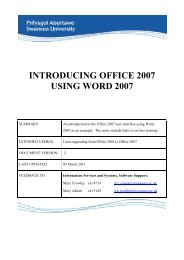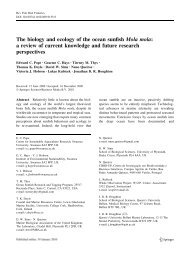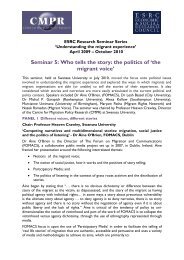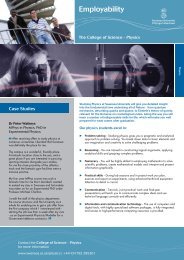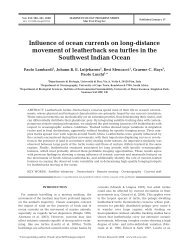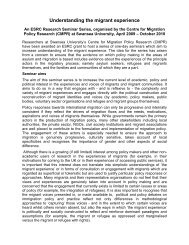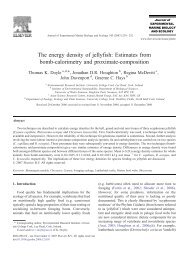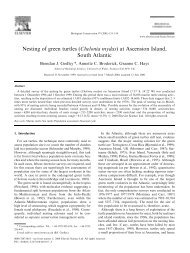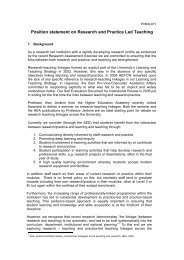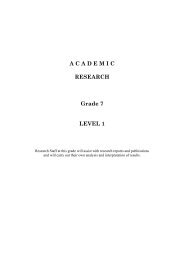Postgraduate Prospectus 2013 - Swansea University
Postgraduate Prospectus 2013 - Swansea University
Postgraduate Prospectus 2013 - Swansea University
You also want an ePaper? Increase the reach of your titles
YUMPU automatically turns print PDFs into web optimized ePapers that Google loves.
RESEARCH DEGREES<br />
Research degrees, typically one<br />
– three years in duration, are<br />
academically rigorous programmes<br />
that demand in-depth study of a<br />
topic for a sustained period of time.<br />
The award of a doctorate or other<br />
research degree recognises the<br />
patience and commitment of<br />
successful candidates, the high-level<br />
skills they have gained, and their<br />
ability to present original research<br />
that furthers understanding of the<br />
subject matter.<br />
Research students will normally undertake<br />
some training in research methods before<br />
embarking on their programme of<br />
research. They will have an academic<br />
supervisor who will advise and support the<br />
direction of their research for the duration<br />
of the degree, and a co-supervisor will<br />
provide additional support as required.<br />
After submitting a PhD thesis, students are<br />
normally expected to defend their thesis<br />
orally in a viva voce examination, and to<br />
demonstrate how their research is original<br />
and contributes to the field of study.<br />
RESEARCH DEGREES – INDEX<br />
92 Ageing Studies<br />
94 American Studies<br />
96 Biosciences<br />
98 Business Management<br />
100 Classics, Ancient History and Egyptology<br />
102 Computer Science<br />
104 Criminal Justice and Criminology<br />
106 Cymraeg – Academi Hywel Teifi<br />
108 Economics<br />
110 Engineering<br />
114 English<br />
116 Geography<br />
Choosing a research topic<br />
Research degrees, especially at MPhil<br />
and PhD level, are very different from<br />
undergraduate and taught Master’s<br />
programmes as there is no defined list of<br />
courses to choose from. MPhil and PhD<br />
degrees can be pursued on any academic<br />
topic, as long as the College you are<br />
applying to has the expertise to guide<br />
and supervise your study.<br />
You should normally identify a topic area<br />
within which you would wish to work and<br />
discuss this with the Admissions Tutor for<br />
the subject area before making a formal<br />
application. Even if you have a more<br />
developed research proposal in mind, we<br />
recommend that you approach the relevant<br />
Admissions Tutor for advice.<br />
Potential applicants are partnered with<br />
potential supervisors at an early stage.<br />
This chemistry is vital to ensuring:<br />
• that you receive the advice and<br />
guidance you need to decide whether<br />
or not a research degree at <strong>Swansea</strong><br />
<strong>University</strong> is right for you<br />
• that the supervisor is enthused and<br />
motivated by the topic<br />
• that you move smoothly into an<br />
appropriate research group (where<br />
applicable)<br />
• that you complete and write up your<br />
research within the required timeframe.<br />
Information about the research strengths of<br />
each academic area can be found in the<br />
following subject entries and on the<br />
<strong>University</strong> website (www.swansea.ac.uk).<br />
These strengths will provide an insight into<br />
the broad subject areas that research<br />
degrees can be supervised in and, ideally,<br />
you should be able to relate your<br />
proposed research area to these topics.<br />
Which research degree?<br />
The <strong>University</strong> offers a number of research<br />
degrees, including:<br />
PhD: PhD students undertake supervised<br />
research over a three-year, full-time period<br />
of study. Research is then presented in the<br />
form of a thesis of not more than 100,000<br />
words. The thesis must demonstrate the<br />
student’s capacity to pursue original<br />
research and should represent a distinct<br />
and significant contribution to the subject.<br />
118 Health and Social Sciences<br />
120 History<br />
122 Law<br />
124 Mathematics<br />
126 Media Studies<br />
128 Medicine<br />
132 Modern Languages and Translation<br />
134 Physics<br />
136 Politics, International Relations and Development Studies<br />
138 Psychology<br />
140 Sport and Excercise Science<br />
141 War and Society<br />
The first year of registration for a PhD<br />
is a period of official probation, requiring<br />
departmental assessment before the<br />
candidate is allowed to proceed.<br />
MPhil: may be completed in two to three<br />
years’ full-time study (four-five years<br />
part-time). Candidates are required to<br />
submit a thesis of up to 60,000 words<br />
and assessment is in the form of an oral<br />
examination (viva).<br />
In some cases, there may be opportunities<br />
for students to upgrade from the degree<br />
to PhD during the course of their studies.<br />
MA/MSc/LLM by Research: Typically one<br />
year full-time, two to three years part-time.<br />
This is an individual research project<br />
written up into a thesis of 30,000 words.<br />
MRes: The aim of the MRes (Master of<br />
Research) is to provide relevant training<br />
to acquire the knowledge, techniques and<br />
understanding needed for a professional<br />
career, or for progression to higher<br />
academic studies, normally a PhD.<br />
The MRes is achieved through a<br />
combination of taught modules (worth<br />
60 credits) and a research thesis which<br />
presents the outcome of a significant<br />
research project (worth 120 credits).<br />
EngD: The Engineering Doctorate prepares<br />
Engineering students for research and<br />
technology leadership careers in industry<br />
and is fully supported by the Engineering<br />
and Physical Sciences Research Council.<br />
The EngD is a four-year scheme consisting<br />
of one year of taught modules followed by<br />
an industry-linked research project. For<br />
further information, see page 110.<br />
MD: In addition to the PhD, the School of<br />
Medicine offers the postgraduate degree<br />
of Doctor of Medicine (MD) through<br />
supervised research within individual<br />
research groups.<br />
DProf: (Doctorate in Professional Practice):<br />
The DProf is a six-year, part-time Doctorate,<br />
aimed at professionals working in the<br />
health and social care professions as well<br />
as higher education. The programme is<br />
underpinned by a philosophy which values<br />
the professional context of the candidate’s<br />
own practice and is therefore focused on<br />
research conducted by practitioners in their<br />
own workplace. Although the structure of<br />
the programme is similar to the traditional<br />
PhD programme it is structured around<br />
three themes, which include:<br />
• Planning research for practice<br />
• Initiating and managing change<br />
• Evaluation and synthesis of theory<br />
and practice.<br />
The degree ensures that the candidate’s<br />
profession and workplace interconnect<br />
throughout the whole programme, so that<br />
research conducted is relevant to their own<br />
practice and workplace.<br />
Is a research degree right for me?<br />
Yes, if you want to:<br />
• Pursue a career in academia or research<br />
• Explore an individual topic in depth<br />
• Acquire extensive and specialised<br />
research skills<br />
• Enhance your career prospects.<br />
Can I study part-time?<br />
Part-time study is possible for UK and EU<br />
students, but you are encouraged to<br />
contact the Academic Department in<br />
question before applying. Part-time study<br />
is not possible for international students.<br />
Assessment through the medium<br />
of Welsh<br />
You may present research work in the<br />
Welsh language if your supervisors are<br />
able to oversee work through the<br />
medium of Welsh.<br />
For details of the <strong>University</strong>’s range of<br />
taught Master’s programmes, please<br />
see pages 29 – 89.<br />
90<br />
91



